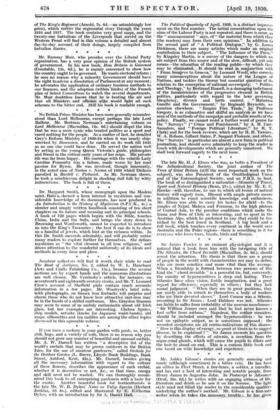The Political Quarterly of April, 1930, is a,distinet improve. merit
on the first number. The initial concentration upon the aims of the Labour Party is not repeated, and there is more, as the " announcement " says, of " the material from which they (the readers) may form their own opinions." In addition to the second part of " A Political Dialogue," by G.Lowes Dickinson, there are many articles' which make an Original contribution to their subject. ",The Influence of the Press," by Kingsley Martin, is a survey of the dangers to which we are subject from this soince and of the slow, difficult, yet sole means—the education of the reading public—by which they May be eliminated.; It should be read in conjunction with " From Serajevo to, Geneva," by Leonard Woolf, who corrects mink misconceptions about the nature of the League of Nations, and tackles the thorny but essential question of its relation to the conception of national sovereignty. " Polities and Theology," by Bertrand Russell, is a damaging indictment of the inconsistencies of the progressive element in British politics, particularly with regard to the laws governing blasphemy, divorce and birth control. "Mahatma Gandhi and the Government," by-Reginald Reynolds, we mention elsewhere. "Empire Free Trade," by Professor Gregory, is as exhaustive and skilful an analysis as we have seen of the Methods of the campaign and probable results of the policy. Finally, we cannot resist a further word of praise for the "Surveys"("Crime and Punishment," by A. M. Carr- Saunders; and Foreign Political Literature," -by R, T. :Clark) and for the .book reviews, which are by R. H. Tawney, W: A. Robson, Gilbert Slater, P. Sargant Florence, and others. The" Surveys "in particular are almost a new form in political journalism, and should serve admirably to keep the reader in touch with developments which are generally unnoticed. We shall look forward eagerly to the next issue.
* * * *










































 Previous page
Previous page